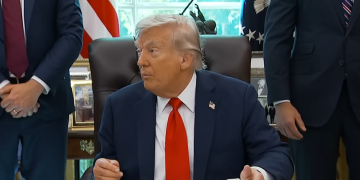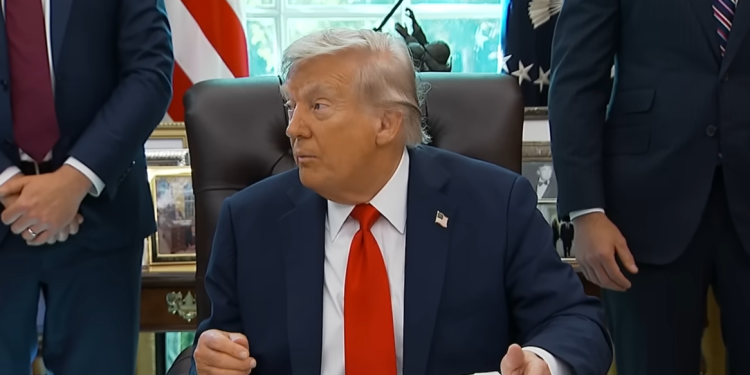President Donald Trump’s new executive order targeting the burning and desecration of the American flag has drawn criticism from prominent voices within the conservative movement. The directive, signed Monday, has created a public rift, with critics on the right arguing that the move represents an overreach of executive power that is at odds with the First Amendment.
The executive order, titled “Prosecuting Burning of the American Flag,” directs the Attorney General to prioritize the prosecution of flag desecration when it is done in a manner that violates “content-neutral laws” and causes “harm unrelated to expression.” The order specifies that such actions could include “violent crimes; hate crimes, illegal discrimination…and crimes against property.” It also directs federal authorities to pursue litigation to clarify the scope of constitutional protections for such acts. Additionally, the order permits the denial of visas or removal from the United States for foreign nationals who engage in flag desecration.
The order prompted a debate among conservatives, with many voicing strong opposition on social media. Fox News chief political analyst Brit Hume blasted the move, writing that it “flies in the face of constitutional speech protections.” He contrasted Trump’s approach with that of former President George H.W. Bush, who also opposed flag burning but called for a constitutional amendment, recognizing that the practice could not be banned by executive order.
Others echoed Hume’s sentiment, arguing that the act of flag burning, while offensive, is protected speech. Radio host Jesse Kelly called the order “garbage,” while commentator Dana Loesch wrote that “the government has no right to control speech or expression.” RedState writer Bonchie called the order “unconstitutional” and merely for “show.”
This sentiment is rooted in established constitutional law. The Supreme Court ruled in the 1989 case Texas v. Johnson that flag burning is a form of protected symbolic speech under the First Amendment. One year later, in United States v. Eichman, the Court struck down a federal law intended to criminalize the act. In a 2012 interview, the late conservative Justice Antonin Scalia, a member of the majority in both decisions, defended the rulings, stating that while he would personally not permit it, “we have a First Amendment, which says that the right of free speech shall not be abridged.”
However, some conservatives have come to the order’s defense, arguing that its text has been misinterpreted as a blanket ban. They point to the qualifiers within the executive order. Writer Kristen Mag stated that the order “does NOT criminalize burning the American flag,” but rather “criminalizes flag burning only when it’s intended to incite violence or when it’s accompanied by other lawless action.”
Ed Whelan of the Ethics and Public Policy Center similarly noted that the order is “replete with qualifiers” and operates “within the bounds permitted by law.”
In a statement, White House spokesperson Taylor Rogers said President Trump “will not allow the American Flag… to be used as a tool to incite violence and riots” and that he “will always protect the First Amendment, while simultaneously implementing commonsense, tough-on-crime policies.”
The order’s legal argument rests on a narrow distinction: the Supreme Court has never held that flag desecration that is likely to incite “imminent lawless action” or that amounts to “fighting words” is constitutionally protected. The order, according to the administration, is an attempt to target these specific exceptions.
The executive order is part of a broader push by the Trump administration to crack down on crime and homelessness, particularly in the nation’s capital. The order has angered critics who argue the president is overstepping his authority by attempting to address a constitutional matter through executive action.




























